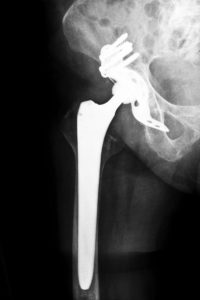
Nevada hip replacement lawsuit attorneys note that, every year, roughly 250,000 people undergo a hip replacement surgery. It is estimated that about one-third of those operations are conducted using a metal-on-metal hip joint. Intended to be more durable than other artificial joints, many metal on metal hip replacements have been discovered to be prone to early device failure, and they have also been linked to metal poisoning.
If you or someone you love has had a metal-on-metal hip implant and experienced severe complications, contact Attorney Group for Nevada. We can help answer your questions and explain your options to you. If you choose to pursue a case, we can connect you with an affiliate hip replacement lawsuit attorney in Nevada or another state who can help you throughout the legal process.
What Is a Metal Hip Replacement?
A metal hip implant uses metal components to create an artificial joint. A patient suffering from hip pain will undergo surgery to have the device implanted. The joint is supposed to last for 15 years or longer before it would need to be replaced. However, as many people have seen, that is often not the case.
How Do They Work?
A metal hip replacement is designed to replicate your joint. Once implanted, it is supposed to act similarly to the way your hip would if it were healthy. Metal-on-metal hips use a metal ball and a metal socket, as opposed to other implants that use materials such as plastic or ceramic.
Risk of Injury?
There is the possibility that a metal hip replacement could lead to serious complications. Studies show that between 1 and 3 percent of people who receive a metal joint will suffer complications from the device. For this reason, according to the head of orthopedic surgery at the Mayo Clinic, physicians have decreased the use of these joints by 80 percent. The clinic also notes that surgeons there have performed dozens of revision surgeries as a result of metal debris.
Risk of Metal Hip Replacements
Unfortunately, the pieces of these metal joints can rub against each other while in use, creating a friction that causes the components to wear down quickly. Further, recent studies have found that the rubbing action can cause metal debris to break loose from the implant. Those pieces can then get into the patient’s bloodstream.
When this occurs, a patient is at risk of metal poisoning. Surgeons report that having to replace a hip when metal debris is involved will lead to a more complex procedure. Thousands of Americans are at risk of experiencing an adverse event following a hip joint replacement using a metal-on-metal implant. Those complications may include the following:
- Inflammation and swelling at the site of the surgery
- An implant that dislocates or loosens
- Bone and tissue loss
- Severe pain, either while the patient is in motion or still
For many, it is also possible that they will have to undergo additional surgeries to correct an issue with the original hip implant.
Other Metal Hip Replacement Side Effects
In addition to the above complications, there is also the chance that the friction that occurs from the pieces of the joint rubbing together will lead to metallosis. This is a metal toxicity that manifests with debris from the joint spreads through a patient’s body. The patient could experience physical reactions, such as having headaches, dizziness and confusion. Metallosis is also known to cause complications with the gastrointestinal system and the nervous system.
For someone who receives a cobalt hip implant could suffer cobalt poisoning, this condition can lead to problems with hearing and sight. People who experience cobalt poisoning may also develop skin rashes, hypothyroidism and even cardiomyopathy.
Injured Patients May Be Entitled to Compensation
Medical device makers have a duty to provide safe products. If there are risks of harm associated with their devices, they also must provide adequate warnings. If a device maker fails to fulfill this duty, it could be held liable for injuries that may result.
Patients who are injured by metal on metal hip replacements may be entitled to compensation for damages, including:
- Medical expenses
- The permanency of the injury
- Pain, suffering, and mental anguish
- Loss of income or ability to work
If a patient dies from complications related to a defective metal on metal hip replacement, his or her family members may be entitled to compensation for the wrongful death of their loved one, including:
- Conscious pain and suffering of a loved one prior to death
- Pain, suffering, and mental anguish from the loss of a loved one
- Funeral expenses
Patients who have suffered severe complications from their metal hip replacements, as well as the families of those who have died as a result of complications with the device, are encouraged to seek the advice of a Nevada metal hip replacement lawsuit attorney to learn more about their rights and remedies
Contact Us For More Information
If you or a loved one are suffering from complications related to your metal hip, contact Attorney Group for Nevada for more information. You can fill out the form on this page, call us at the number listed at the top of the page, or email us at info@attorneygroup.com.
When you contact us, an attorney will follow up with you to speak with you about your case or answer questions that you might have. There is no cost or obligation to speak with us, and any information you provide will be kept confidential.
Please note that the law limits the time you have to pursue a claim for an injury. If you think you have a case, you should not delay taking action.
See our Frequently Asked Questions page for more information, and contact Attorney Group for Nevada today.





